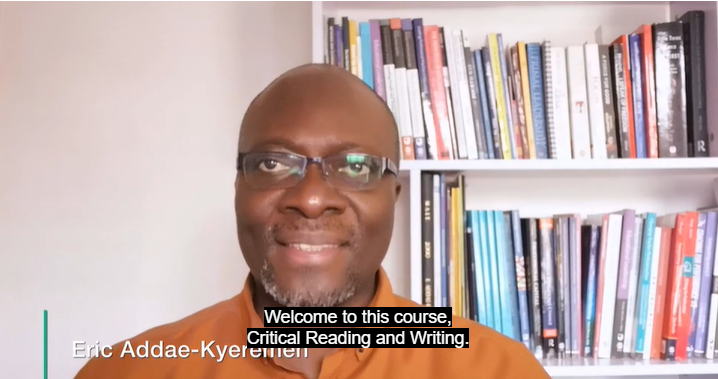How important are critical reading and writing skills?
Watch our instructor Dr Eric Addae-Kyeremeh talk you through some of the Critical Reading and Writing course activities and the importance of these critical skills during the academic journey. Additionally, we have added a short guide from the first course module demonstrating the most common process words you’ll encounter in an assignment/assessment question and what they really mean.
About the course
As part of our dissertation skills learner pathway, this new self-paced and instructor-led online course equips students with the skills and knowledge to make the jump to higher education. It teaches reading strategies to evaluate and question written and visual texts while helping build confidence in structuring a critical writing piece, spelling out arguments and integrating evidence.
what is expected from me at university?
Making Sure You Understand the Question
When working on any university assignment or assessment, you should use your critical thinking skills to make sure that you understand the question fully. For instance, if the question asks you to “compare and contrast” two different approaches, you will know that you have to devote some of your word count to one approach and some to the other. Likewise, if the question asks you to “assess the value of X to our understanding of Y,” you will have two points of focus in your answer.
Looking closely at the assignment question, and the “process” words or key words used, can help you understand the aspects of critical thinking to apply in your answer. Different words require different responses.
Here’s a guide to the most common process words you’ll come across in your assignment questions and what they really mean.
Expand each accordion item for more information
1. Evaluate, assess, defend
Evaluate: make an appraisal of the worth/validity/effectiveness of something. This implies you must make your judgment as to what extent statement pieces of information are true, or to what extent you agree with them. In providing your verdict, you must show you have considered evidence from a wide range of sources which both agree with and contradict an argument. Come to a final conclusion, basing your decision on what you judge to be the most important factors and justify how you have made your choice.
Assess: determine the value of or weigh up. Conclude by stating clearly how far you agree with the original proposition.
Defend: you will need to prepare a reasoned judgment not only based on your analysis to persuade the reader of your argument by citing relevant research but also remember to point out any flaws and counter-arguments as well.
2. Apply, demonstrate, illustrate
Apply: you will need to apply the subject (to a given situation)
Demonstrate: show how, with examples to illustrate
Illustrate: you will need to make your arguments clear and explicit with carefully chosen examples
3. Compare, contrast, examine
Compare: look for and show the similarities and differences between examples, perhaps reach a conclusion about which is preferable and justify this
Contrast: set in opposition in order to bring out the differences – you may also note that there are similarities
If you are asked to compare and contrast, you should find some points of common ground between two or more items and show where or how they are different.
Examine: you will need to analyze the argument and look into detail at the line of argument
4. Define, list, outline
Define: give the exact meaning of a word or phrase, perhaps examine different possible or often-used definitions
List: you will need to identify each aspect of the content in a logical order and explain the relevance in terms of the assignment question or topic
Outline: give the main features or general principles of a subject, omitting minor details and emphasizing structure and arrangement.
This course is now available on the SAGE Campus platform. If you’re interested in the course for yourself or for use at your institution, try a free module on our demo hub!
SAGE Campus is a digital library product, so you can only access it via your institution. Librarians can request a full 30-day free trial and faculty/researchers can recommend us to your library or request a trial if you are an administrator via this form.









